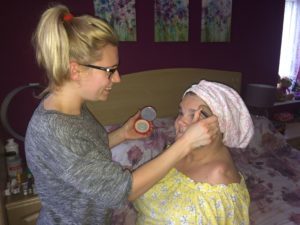 Determining Support Needs - Flexibility, Choice and Control
Determining Support Needs - Flexibility, Choice and Control
Beneficiaries want to live their lives as independently as possible, and many find a Personal Assistant is the best way to do this. It is not usually practicable to try to break their care and support needs into chunks of time, for example 1 hour a day for personal care, as, like most of us, these needs will vary from day to day depending on their plans, feelings and wishes.
Please support them to have dignity, choice and control in their care planning.
Common areas of daily life where functional restriction occurs
Managing and maintaining nutrition
Thalidomide survivors may have a reduced ability to cut, chop, lift, and stir safely. There is a likelihood of burns due to reduced reach and proximity of hot items to body. They may need to have food cut up or be fed. Some may be unwilling to eat in public or require assistance to do so if they would normally use their feet to eat at home. The risk of falls is increasing if using legs/feet for cooking or eating. Weight management can be an issue due to reduced mobility, pain and low mood.
 Maintaining personal hygiene
Maintaining personal hygiene
Thalidomide survivors may be unable to reach all parts of their body for washing and dressing due to reduced reach, inflexibility, limited range of movement, poor balance and/or pain. They often develop their own methods which may be unsafe and or cause pain and fatigue – for example putting a sponge on the shower wall and rubbing against it. There is a risk of slipping and falling in shower/bath and a high level of fear of this, so even if can bathe alone may need another person to be in the house.
(Image shows shower attachment to assist washing when reach is restricted.)
Managing toilet needs
Thalidomide survivors may need support when transferring, cleaning themselves, or need extra space for a prosthesis or wheelchair. They may have an adapted toilet at home. They may also have a lot of difficulty cleaning themselves after an ‘accident’.
Being appropriately clothed
Clothes need to be specially adapted – e.g. shortened sleeves, and easy to wear. Some thalidomide survivors avoid underwear and bras as they are too difficult to manipulate.
Belts, buttons, zips cannot be used without help. Thalidomide survivors often choose slip-on shoes or shoes that can be removed easily if feet are used to undertake tasks. If they have leg damage, they will have difficulty transferring and may need to sit on the floor in the shower.
Being able to make use of the home safely
 Thalidomide survivors are often at higher risk of harm because of the coping strategies they use to maintain independence. For example, climbing onto worktops to reach items if they have short limbs. For this group, short upper limbs make breaking a fall difficult, and therefore injuries can be more intense. Many typical aids and adaptations that would be offered, such as grab rails, are unsuitable. (Image shows an adapted kitchen to enable a person with short arms to access cupboards, worktops and appliances.)
Thalidomide survivors are often at higher risk of harm because of the coping strategies they use to maintain independence. For example, climbing onto worktops to reach items if they have short limbs. For this group, short upper limbs make breaking a fall difficult, and therefore injuries can be more intense. Many typical aids and adaptations that would be offered, such as grab rails, are unsuitable. (Image shows an adapted kitchen to enable a person with short arms to access cupboards, worktops and appliances.)
Thalidomide survivors also live with chronic pain, so may have to take high strength pain killers which can cause drowsiness. Everyday activities such as cooking carry increased risk of burns or scalds due to proximity to the hob, kettle etc.
There is an increased risk of unintentional self-neglect, especially with personal care and toileting routines, as thalidomide survivors may decline support due to embarrassment.
The risk of isolation and loneliness is very high and exacerbated by the challenges faced when socializing in the community, as detailed in the paragraphs below.
Maintaining a habitable home environment
If thalidomide survivors have short arms, simple tasks such as cleaning a kitchen worktop or the bathroom can be extremely difficult due to lack of reach. Pain and fatigue can make vacuuming and mopping difficult, and appliances are made for able-bodied people. Tasks such as laundry and changing bed linen can be impossible, or take much longer than they would typically. Simple home maintenance that an able bodied person may usually do themselves, such as changing a light bulb, putting in batteries or using a screwdriver for a simple task can be difficult or impossible for thalidomide survivors with damaged hands and digits, requiring the help of others, or even paid assistance for routine jobs.
Developing and maintaining family or other personal relationships; Accessing and engaging in work, training or volunteering
Some thalidomide survivors have a hearing impairment as a direct result of their thalidomide damage. It is also a very common feature of thalidomide damage to have narrow ear canals which frequently become blocked with wax, affecting hearing. Inserting and removing a hearing aid is very difficult for someone with short/no arms. Using sign language is also difficult for someone with arm or hand damage.
Sight impairment may result from facial damage and putting on and removing glasses/contact lenses is very difficult for those with short/no arms. Facial disfigurement may also cause speech impairment.
There are high levels of social anxiety and distress as a result of being stared at.
For those with short/no arms, there is a limited ability to gesticulate with hands.
Many thalidomide survivors had interrupted education as a result of repeated surgical interventions and there is some evidence of learning disability and autism amongst the thalidomide group. This has often gone undiagnosed and unsupported because the focus has been on the physical disability and the expectations have been low for some survivors.
Making use of community services
As well as difficulty caused by physical disability, pain and fatigue, there is increasing evidence of mild to severe social phobia and horror of being stared at or photographed which has become more pronounced with the introduction of camera phones and social media. As a result, clients will restrict going out to only where they are known, others may not go out at all and some only go out accompanied. High levels of anxiety and feelings of physical vulnerability can limit thalidomide survivors’ willingness to engage with others. For those with speech and hearing impairment there is emotional vulnerability arising from the inability to make themselves understood.
Caring responsibilities for a child
Due to their typical age, few thalidomide survivors have dependent children.
Reading
As all thalidomide survivors were born between 1959 and 1965 they often had a poor educational experience as a result of frequent hospital appointments disrupting their schooling and low expectations of children with such severe disabilities. Holding a book and turning pages is difficult with short arms. It is often not possible to hold a newspaper. Wearing glasses for reading is not always possible for those thalidomide survivors with facial damage and damaged external ears.
Engaging with others
Carers
 Many beneficiaries may appear independent, but often they are very reliant on informal carers. As they are aging, the need for this support to be identified, and appropriate respite provided to carers is vital. Additionally, local authorities need to understand the needs of beneficiaries should carer arrangements break down, and support beneficiaries to make emergency plans.
Many beneficiaries may appear independent, but often they are very reliant on informal carers. As they are aging, the need for this support to be identified, and appropriate respite provided to carers is vital. Additionally, local authorities need to understand the needs of beneficiaries should carer arrangements break down, and support beneficiaries to make emergency plans.
Carers may need to be encouraged to talk honestly about any challenges with their role and may benefit from speaking to you privately.
Read beneficiary experiences of having personal assistants
Finances
Beneficiaries are in receipt of funding from the Government (the Health Grant) and receive a compensation payment from the Trust. This income is disregarded when Social Care financial assessments are completed – further information can be provided by the Trust.
